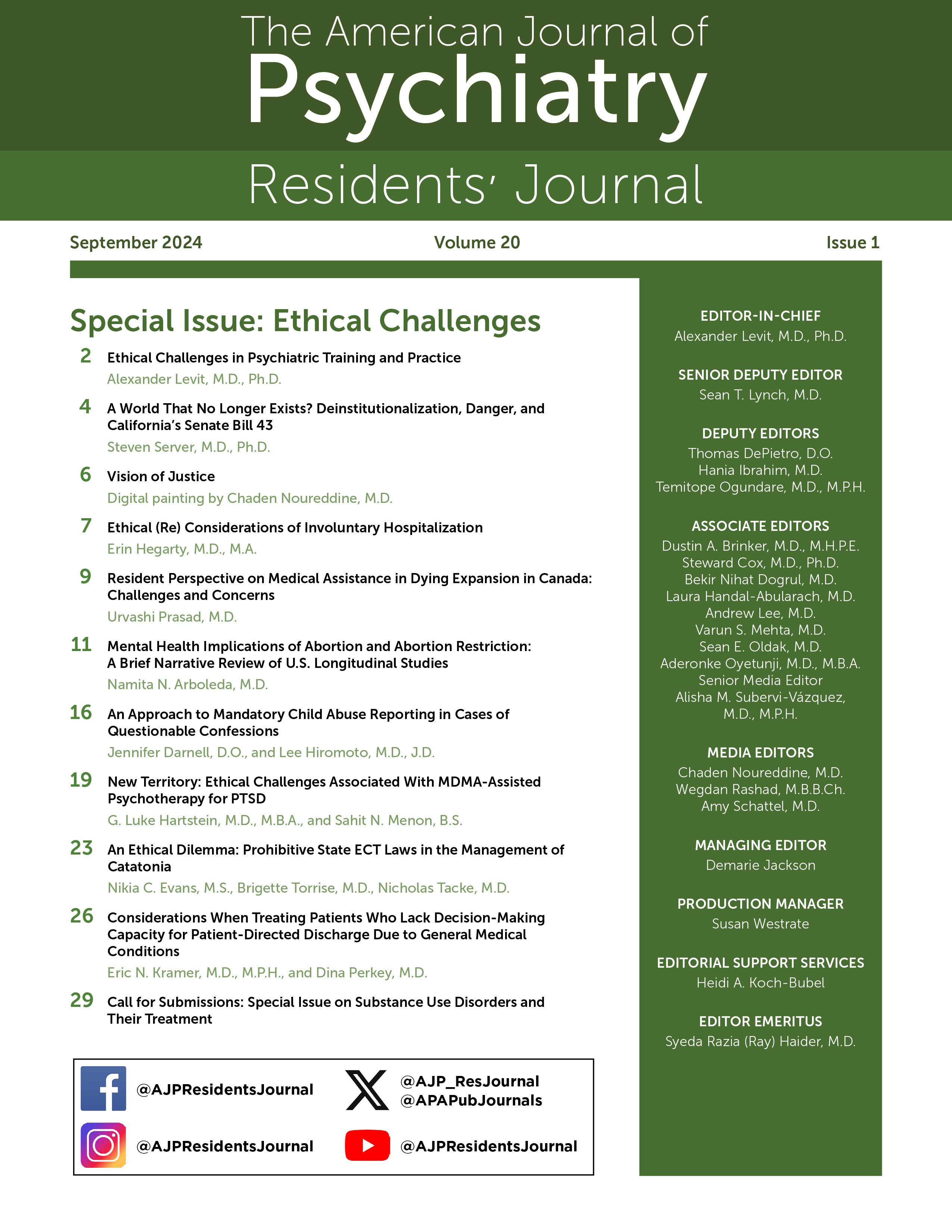In October 2023, with the passage of Bill 43, California adopted several changes that expand involuntary hospitalization and conservatorship law. Notably, patients can now be considered gravely disabled, or unable to meet their basic needs, as a result of substance use disorders, in addition to other mental disorders, such as schizophrenia (
1). California joins 35 other states that allow some form of involuntary commitment of patients with substance use disorders (
2). Patients with substance use disorders can be held involuntarily up to 47 days in California hospitals (or longer if conservatorship is pursued) (
1). This policy change, which will affect hundreds of patients, raises important ethical considerations.
As physicians, we are taught to consider four basic ethical principles: beneficence, nonmaleficence, autonomy, and justice. By definition, involuntary commitment sacrifices patient autonomy and prioritizes beneficence, our duty to act in ways that benefit patients (
3). Hospitalization of patients with substance use disorders promotes their well-being by stopping—or at least pausing—further damage to their physical, relational, and emotional health from substance use. Thus, the ethical justification to prioritize beneficence over autonomy—that the emotional injury of being held against one’s will is worth it—largely depends on whether involuntary treatment for substance use disorders works. Studies to date have yielded mixed results (
4). Furthermore, few states track utilization of involuntary commitment and treatment for substance use disorders, and there are few data examining the likelihood of remission by type of compelled treatment (
5). How, then, can we ensure that the benefit to patients is real and not just assumed?
Nonmaleficence—our duty not to harm patients (
3)—raises additional questions. Almost one-third of patients relapse the day of release from mandated substance abuse treatment (
6), and data show that periods of forced abstinence increase the risk of fatal drug overdose (
7). Is involuntary hospitalization just setting patients up to fail? And could forced detoxification, which often involves both physical discomfort and emotional resentment, without clear benefit be considered harmful to patients?
Justice, the fourth ethical principle regarding our duty to provide fair and equitable treatment (
3), introduces a classification question. Are substance use disorders the same as other mental health conditions, such as schizophrenia, for which involuntary treatment is generally supported? We routinely administer treatment involuntarily to patients with psychotic disorders despite no guarantee of maintaining remission. Perhaps patients with psychotic disorders who stop taking their psychotropic medications on leaving the hospital are not dissimilar to patients with substance use disorders who resume substance use after discharge. That said, it is easier to determine when a patient is no longer floridly manic or psychotic than it is to determine whether a patient has sufficiently restored enough cognitive control, which is weakened by long-term substance use (
8), to maintain sobriety after a period of forced treatment.
A final ethical question that is much too large and important to address in the confines of this short commentary is how this may affect ethnic and racial minorities who are more likely to be in the legal system (
9). Could this be another instance of taking away autonomy from groups whose autonomy has already been denied by society for years?
Despite ethical uncertainty, California can implement this bill in a way that maximizes beneficence and minimizes nonmaleficence. This should include providing clinicians with specific guidelines, including what types of treatment can be mandated, to ensure that involuntary hospitalizations are more than 3-day forced detoxifications. The state should also track involuntary hospitalization rates, treatment methods, and outcomes in a variety of hospitals to properly evaluate the efficacy of the new bill. With more time and appropriate data, I am hopeful that legislation can be crafted that minimizes the tension between autonomy and beneficence.
Acknowledgments
The author thanks Alaina Burns, M.D., for editorial advice.
